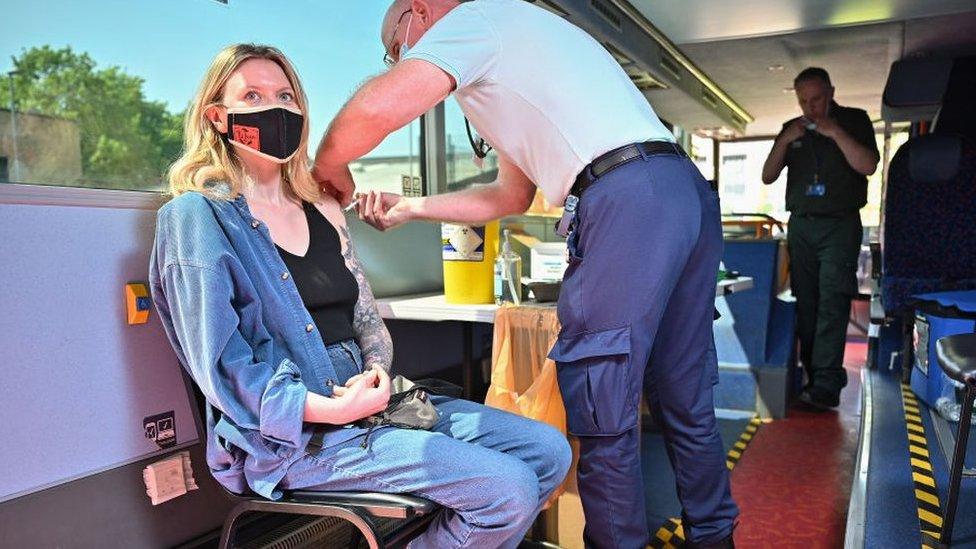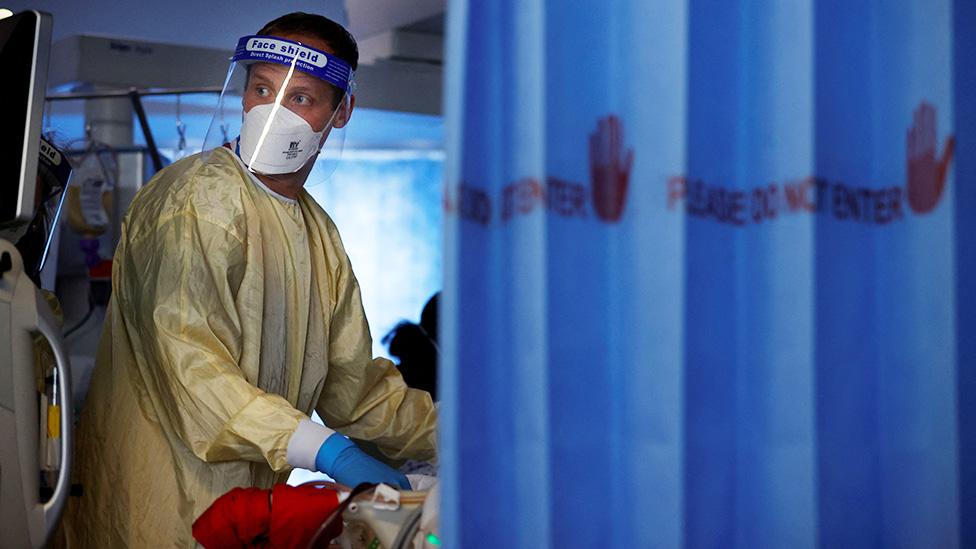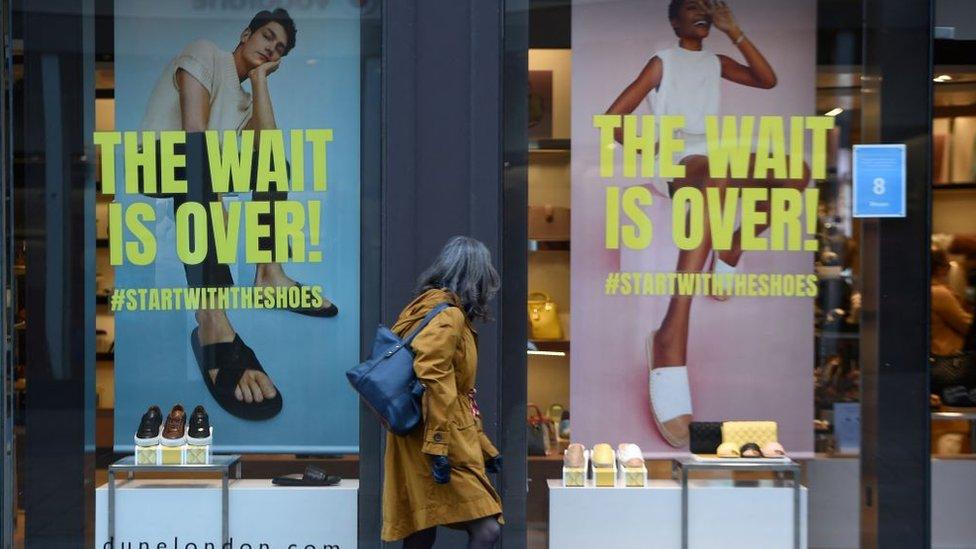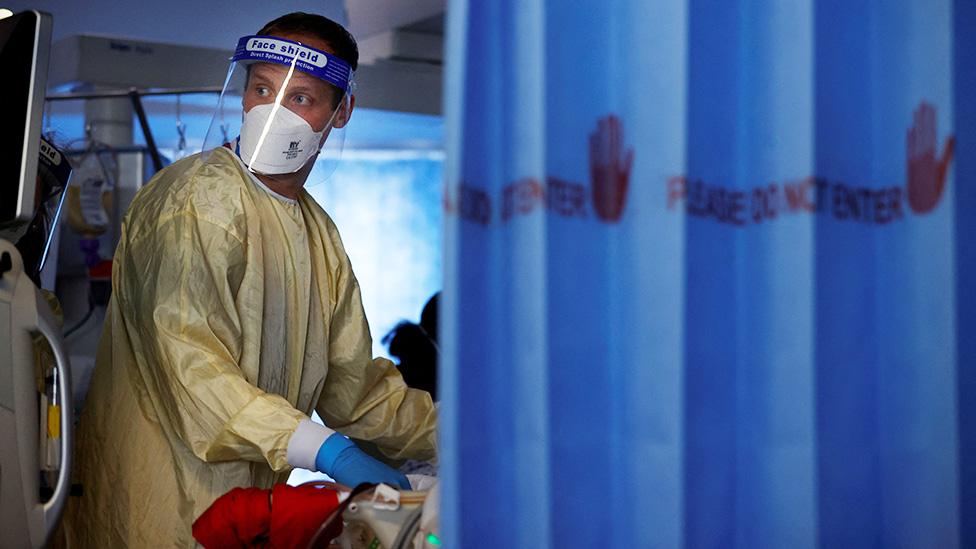Covid in Scotland: Can we stop worrying about high case numbers?
- Published
- comments

As vaccination reduces serious illness no new restrictions are being introduced
Vaccination is offering Scotland the "route out" of the pandemic, according to Nicola Sturgeon. The first minister told MSPs this week that the link between new cases and the serious health harms caused by the virus hasn't gone away - but it is weakening significantly.
Scotland recorded 2999 new cases of Covid-19 on Thursday - a record high. What do recent figures show us about this link? And does this mean we no longer have to worry about case numbers?

What's happening to the infection rate in Scotland?
Cases are rising fast - and there are no signs yet that the rate of new infections is slowing.
Scotland had been enjoying a sustained decline in the number of new Covid-19 cases, but that all changed on 5 May.
Since then, the number of new Covid cases per day has mainly been rising, and at an increasing pace in recent days.
On 5 May, the number of cases detected over the previous seven days was 1,046. By 23 June, this figure had gone up to 11,067 - a 10-fold increase.

Scotland also has the highest case rate among all of the UK nations, reaching almost 203 cases per 100,000 people on Wednesday.
The sharp rise is being driven by the more infectious Delta variant, first identified in India, which accounts for more than 90% of new cases in the UK, according to the UK government, external.
However, the Scottish government says fewer people are being treated in hospital for Covid illness now and fewer people are dying, despite this increase.
Are people still getting sick from Covid?
In short, yes.
But according to the government's analysis, only about 5% of people who are infected end up in hospital, rather than the 10% we were seeing before vaccination started to offer us protection.
People are also staying hospital for shorter periods after being admitted.
The easiest way to see this is in a graph which shows the link between new cases and the number of people in hospital being treated for Covid.

During the outbreaks in the autumn and over the winter, the daily figure on hospital occupancy has closely tracked the daily cases figure, but it's different this time.
The number of people in hospital is trending upwards, but the gap between the two lines is obvious.
To draw a comparison with the end of 2020, when the average number of new cases being recorded a day was similar to now, there were 1,174 Covid patients in hospital. On 23 June, there were 170.
Public Health Scotland publishes data on daily hospital admissions of people with a positive test for Covid, and again there appears to be a different pattern this time.
On 28 August, as the second wave took hold in Scotland, an average of seven people were being admitted a day. It was a similar figure on 5 May 2021, as the Delta variant began to drive a new wave of cases.
This next chart compares hospital admissions from those dates.

For the first three weeks there is not much difference at all between the two lines, but then the rate of new admissions in the autumn begins to rise at a much faster rate.
The evidence on deaths is less clear
There is generally a lag of several weeks between new cases and Covid-related deaths, which means it is harder to draw firm conclusions on whether the link between the two figures is weakening.
Certainly, the number of new death certificates mentioning Covid-19 in Scotland has been reasonably stable over the last few weeks.
However, the rate of new deaths in the autumn did not begin to rise fast until the latter half of October - six to eight weeks after case numbers began going up.

In the seven days up to 6 September just two death certificates mentioned Covid-19, the lowest figure in any week since the pandemic began in Scotland.
After that, weekly deaths began to rise, with 76 recorded in the seven days up to 18 October.
Last week, there were 13 death certificates mentioning Covid-19, according to the National Records of Scotland, external - three weeks after this spring's low of four deaths in the middle of May.
What happens to this rate in the next few weeks will give a clearer indication on how much the link with deaths has weakened.
Linda Bauld, professor of public health at the University of Edinburgh, told BBC Scotland she was expecting the number of deaths to go up.
"We will see more deaths if cases continue to increase and we're going to see those deaths in two groups - the unprotected by full vaccination and, in a small number of cases, people who have had both doses, because the vaccines are not 100% protective," she said.
"So I think it will go up, but I'm hoping that it won't go anywhere near where we were before."
Do we need to worry about case numbers any more?
In the first minister's statement to Holyrood on Tuesday, Ms Sturgeon announced a "revised strategic framework" for tackling Covid, which took into account the protection being offered by vaccination against Covid sickness.
She said that previously the Scottish government was intent on suppressing the virus to the "lowest possible level", but this has been replaced with an aim of suppressing the virus "to a level consistent with alleviating its harms".
This essentially means that higher numbers of cases will be tolerated than in past waves of the pandemic.
The Scottish government's new strategy reflects the latest guidance from the World Health Organization (WHO) on public health and social measures to tackle Covid, external.
In this document, the WHO says the focus can shift from case numbers to hospital admissions and intensive care rates in countries where the most vulnerable are fully vaccinated - a position Scotland will be in by next week, according to the first minister.

Some people will always become seriously ill from Covid
But there is a balance to be struck here.
If case rates are allowed to get completely out of control, then pressure will inevitably increase on the NHS and more will die, Prof Bauld said.
"If we really see these numbers continue to increase, it's still going to translate into some hospital admissions and people becoming very unwell.
"So we've just got to hold the course for a few more weeks and try and send the behavioural message that this is not a free-for-all - we all need to do our bit."
Winter restrictions
A high case rate also increases the risk of new variants of concern emerging - ones that are more infectious, more deadly or which are resistant to current vaccines.
The WHO's document says that some form of Covid restrictions - for example isolating after a positive test - will need to be used "for the foreseeable future".
"Things are improving but it's not going away," Prof Bauld said.
"Into the winter months we're still going to have to have some mitigations... there may be [restrictions] that are put in place again, rather than everything just continuing open indefinitely."
And Prof Bauld also cautioned against governments coming up with an acceptable death rate for Covid-19.
"I think there's pressure on politicians to come up with a number of tolerable deaths from this disease in the future and quite rightly they're resisting that," she said.
"There are also these constant comparisons with flu which is unfortunate, because its much more deadly than influenza - and more transmissible."


The vaccination programme has been operating for more than six months and has been made possible thanks to the hundreds of people who give the jabs. If you are one of those vaccinators, we'd like to hear from you. Why did you get involved and how many jabs have you administered?
You can now get in touch with BBC Scotland on the phone messaging service, WhatsApp.
To start using the app, simply download WhatsApp on to your smartphone free from the internet, external.
Then add our WhatsApp number +44 7902 704679, external to your phone's contact list.
Please make sure you read our terms of use and privacy policy.
- Published22 June 2021

- Published3 June 2021
